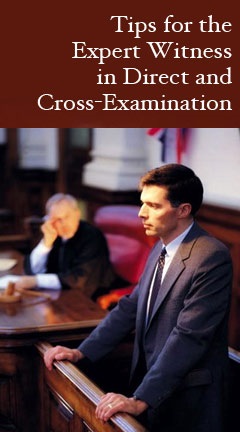Archival Notice
This is an archive page that is no longer being updated. It may contain outdated information and links may no longer function as originally intended.
Home | Glossary | Resources | Help | Course Map
Be an Effective Expert Witness
Seven fundamentals to keep in mind will help the expert become a more effective witness. The expert should:
- Know the professional area.
- Do homework for the case.
- Develop an individual style of delivery and demeanor.
- Be enthusiastic without being an advocate.
- Be prepared for cross-examination.
- Pattern himself after his best teacher.
- Dress to fit the role — dress for success.
It can be most useful for the expert to visualize outstanding and exemplary performance on the witness stand. Use of the word "performance" is intentional. Visualize a sterling performance. Create an image of success that can be built upon without assistance. The expert can do this by becoming a "star" in the expert's own mind — without being showy or pompous. The touchstone of the trial arena for the expert forensic witness is credibility. Teaching skill is the vehicle.
Being aware and using psychological elements of persuasion, body language, repetition, dress, demeanor and similar characteristics help develop testimonial skill and effectiveness. Do not be a "many splendored" expert. Tribunals and the court system lose confidence in the expert who seems to know everything about everything. Nobody is that smart.
- Only answer the question asked; do not volunteer information.
- Be factual, truthful and concrete.
- Stick to the point and be brief.
- Do not argue with examining counsel or the trier of fact.
- Keep cool and do not display irritation.
Additional Online Courses
- What Every First Responding Officer Should Know About DNA Evidence
- Collecting DNA Evidence at Property Crime Scenes
- DNA – A Prosecutor’s Practice Notebook
- Crime Scene and DNA Basics
- Laboratory Safety Programs
- DNA Amplification
- Population Genetics and Statistics
- Non-STR DNA Markers: SNPs, Y-STRs, LCN and mtDNA
- Firearms Examiner Training
- Forensic DNA Education for Law Enforcement Decisionmakers
- What Every Investigator and Evidence Technician Should Know About DNA Evidence
- Principles of Forensic DNA for Officers of the Court
- Law 101: Legal Guide for the Forensic Expert
- Laboratory Orientation and Testing of Body Fluids and Tissues
- DNA Extraction and Quantitation
- STR Data Analysis and Interpretation
- Communication Skills, Report Writing, and Courtroom Testimony
- Español for Law Enforcement
- Amplified DNA Product Separation for Forensic Analysts


